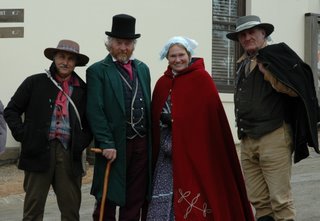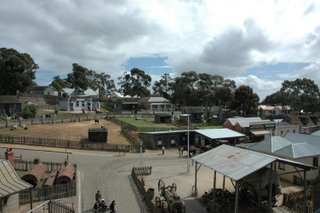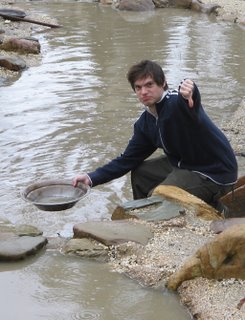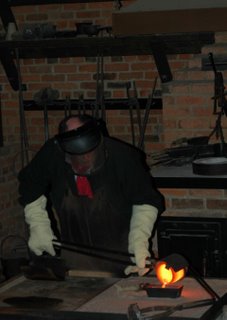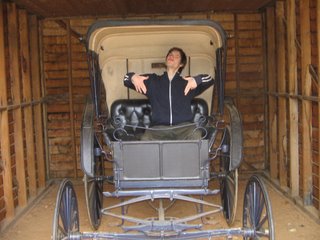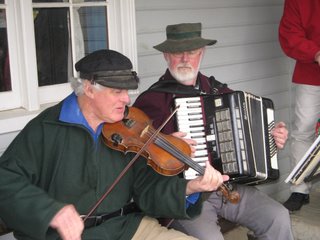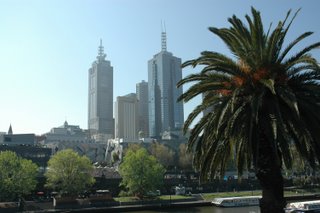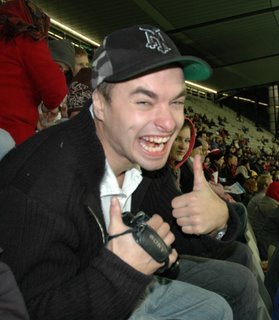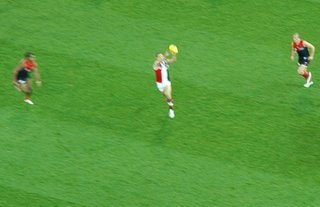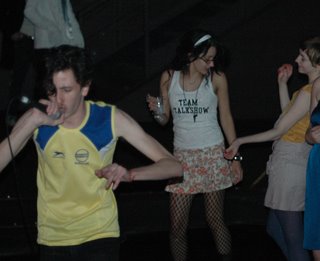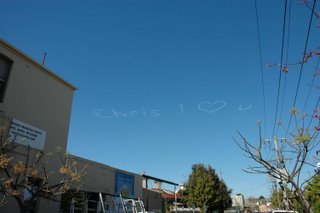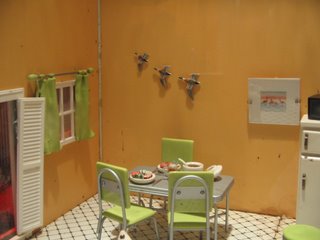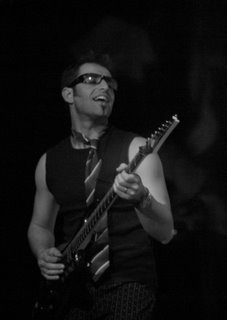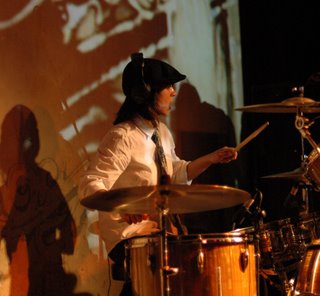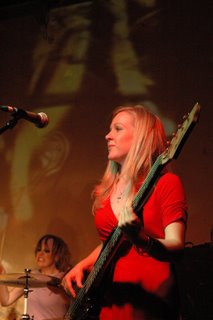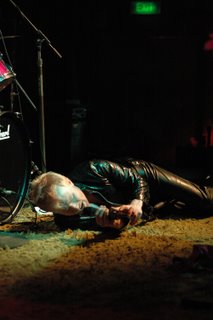Tasmanian Revel
 All around was total stillness ... not a single sound, save for my own tinnitus and a very occasional rustle of the wind in the bushes. I'd not seen another person for a good while, and I started to recall the series of events and decisions that had lead me to this particular situation, so very very different from the hassle, squalor and idiocy of St. Kilda. I'd decided to put my vast reserves of restlessness to good use, desiring to see The Great Outdoors - perchance the "Real Australia". I'd seen a large, red ship with "Spirit Of Tasmania" scored across it, so without thinking about the details too much bought a ticket and took the ride. Across the Bass Strait, where the Roaring Forties buffered the boat this way and that, corkscrewing it's way into the unknown. It got so bad that two previously tough talking blokes ceased their doom mongering, and stories of bearded women driving oil tankers, to start a vomit marathon. Gale force winds, five metre waves ; my beer leapt straight off the table but the crew sat around smiling, so I was untroubled too. At some point I must have slept because when I woke with a start there were dozens of bodies, snoozing on the previously empty floor. In the morning I found my way to Launceston, with no accomodation, transport or any idea what I was going to do. But that was the point - to let go, zoom out, let the details handle themselves. I booked into a fairly nondescript hostel, where the other patrons were thankfully insular.
All around was total stillness ... not a single sound, save for my own tinnitus and a very occasional rustle of the wind in the bushes. I'd not seen another person for a good while, and I started to recall the series of events and decisions that had lead me to this particular situation, so very very different from the hassle, squalor and idiocy of St. Kilda. I'd decided to put my vast reserves of restlessness to good use, desiring to see The Great Outdoors - perchance the "Real Australia". I'd seen a large, red ship with "Spirit Of Tasmania" scored across it, so without thinking about the details too much bought a ticket and took the ride. Across the Bass Strait, where the Roaring Forties buffered the boat this way and that, corkscrewing it's way into the unknown. It got so bad that two previously tough talking blokes ceased their doom mongering, and stories of bearded women driving oil tankers, to start a vomit marathon. Gale force winds, five metre waves ; my beer leapt straight off the table but the crew sat around smiling, so I was untroubled too. At some point I must have slept because when I woke with a start there were dozens of bodies, snoozing on the previously empty floor. In the morning I found my way to Launceston, with no accomodation, transport or any idea what I was going to do. But that was the point - to let go, zoom out, let the details handle themselves. I booked into a fairly nondescript hostel, where the other patrons were thankfully insular. The Cataract Gorge looked as if it might offer the scale and space I was looking for, so I went for a ramble around the First Basin. Despite the usual collection of other tourists, families and staff, ten minutes walk into the trail turned into a complete removal from any evidence of man. The silence and stillness was unlike anything I'd seen before - no sound or sign of another human being. I pressed on up the dusty track, the sun beating down and my head clear of any thought or worry. My only company was the weight on my back and the crunch and snap of an occasional twig. I couldn't say how long I'd been walking; I had a particular sudden sense that a good amount of time had passed without realising. I looked back to where I had walked, and realised that I had not seen another person the whole time, I suddenly got the feeling there was something else there and that I was being watched. I stood still, very still ... who could tell what sort of wildlife there might be around here ? Everyone knows the most dangerous animal in the forest is a human being ... but that didn't change the huge sense of foreboding. I pressed on more cautiously, aware of my surroundings and on the lookout. Sure enough, there was evidence of life everywhere - innumerable rustlings in the undergrowth, a darting sliver of an unseen creature, my every move startling or alerting something. I felt much more a part of my environment, actually in it as opposed to just crashing around in it. Perhaps this is a diluted form of how the animals feel - not just relying on sight.
The Cataract Gorge looked as if it might offer the scale and space I was looking for, so I went for a ramble around the First Basin. Despite the usual collection of other tourists, families and staff, ten minutes walk into the trail turned into a complete removal from any evidence of man. The silence and stillness was unlike anything I'd seen before - no sound or sign of another human being. I pressed on up the dusty track, the sun beating down and my head clear of any thought or worry. My only company was the weight on my back and the crunch and snap of an occasional twig. I couldn't say how long I'd been walking; I had a particular sudden sense that a good amount of time had passed without realising. I looked back to where I had walked, and realised that I had not seen another person the whole time, I suddenly got the feeling there was something else there and that I was being watched. I stood still, very still ... who could tell what sort of wildlife there might be around here ? Everyone knows the most dangerous animal in the forest is a human being ... but that didn't change the huge sense of foreboding. I pressed on more cautiously, aware of my surroundings and on the lookout. Sure enough, there was evidence of life everywhere - innumerable rustlings in the undergrowth, a darting sliver of an unseen creature, my every move startling or alerting something. I felt much more a part of my environment, actually in it as opposed to just crashing around in it. Perhaps this is a diluted form of how the animals feel - not just relying on sight. Deep in the bowels of the open air cafe I encountered half a dozen or so of these strange creatures, previously unseen by man. They have a most striking plumage, a raucus call, and display not one iota of fear as they snatch dougnuts from slow witted tourists. I have therefore decided to name them "Rudebirds" - though I suspect they are not indiginous to the area.
Deep in the bowels of the open air cafe I encountered half a dozen or so of these strange creatures, previously unseen by man. They have a most striking plumage, a raucus call, and display not one iota of fear as they snatch dougnuts from slow witted tourists. I have therefore decided to name them "Rudebirds" - though I suspect they are not indiginous to the area.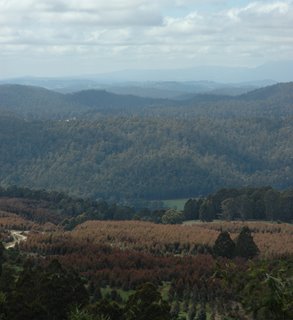 Hobart, the state capital was to be my next destination, a straight out blaze through the highways and backroads of the midland. Johnny Cash for company, heading south at a hundred and ten per, grin as wide as the Cataract Gorge. I got my first taste of the splendour and variety of the Tasmanian countryside - vast yellow tracts of cornfields, mouth as dry as the scrubland, running my tongue around my teeth to feel the jagged mountains on the horizon. I stopped for a piss at St. Peter's Pass, and got a good laugh when two youths asked if I needed a hand trashing my rental car. They'd just seen Jackass and reckoned we could go and do a load of 'nutties' in the car park, perhaps write the car off, for the low, low price of $6 insurance. It seems that there's no shortage of dickheads, liars and chancers in this part of the world either - but I guess you can't expect everyone you meet to discuss Proust over a game of croquet.
Hobart, the state capital was to be my next destination, a straight out blaze through the highways and backroads of the midland. Johnny Cash for company, heading south at a hundred and ten per, grin as wide as the Cataract Gorge. I got my first taste of the splendour and variety of the Tasmanian countryside - vast yellow tracts of cornfields, mouth as dry as the scrubland, running my tongue around my teeth to feel the jagged mountains on the horizon. I stopped for a piss at St. Peter's Pass, and got a good laugh when two youths asked if I needed a hand trashing my rental car. They'd just seen Jackass and reckoned we could go and do a load of 'nutties' in the car park, perhaps write the car off, for the low, low price of $6 insurance. It seems that there's no shortage of dickheads, liars and chancers in this part of the world either - but I guess you can't expect everyone you meet to discuss Proust over a game of croquet.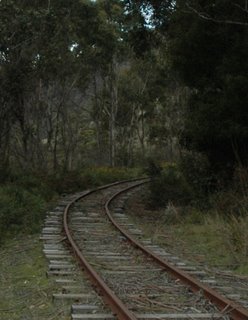 40% of Tasmania is designated as reserves or national parkland, and after the trek about Cataract Gorge, I was keen to see more - this time at Mt. Field National Park (founded in 1916). A more taxing drive presented itself, long winding single lane highways, train tracks that appear from nowhere and disappear again into the forests. There were a disconcerting number of skid marks along the way, snaking their way between both lanes for surprising distances. It's very easy to get distracted whilst driving around here - the scenery dominates everything you see; sea birds swoop and glide alongside, gazing back through the window. Very important to concentrate for other reasons as well - it's possible to drive for hours without seeing anyone else around - particularly in the southwest wilderness area. Empty highway in front and in the sideview mirrors, there's no way you'd be found in the case of a crash or running out of fuel. The only other vehicles you might see are 18 wheelers loaded with timber, or a farmer shiftin' hogs in a trailer. At one point I suddenly realised that I had missed a turning and was in the depth of the Gordon Forest - about sixty clicks off course, and 1500m higher than I intended to be. I drove past decimated hills that had been razed almost clean of trees from logging. This is a heated environmental topic around here, with passionate views on both sides of the argument. I spent a good few hours trekking around Russel Falls and other parts of the alpine park, only seeing a handful of other people in that time. Again during that time I felt as if my senses were heightened, and any noise in the undergrowth made me stop in my tracks to see what was there. If you actually want to see any wildlife, you have to be extremely patient - the wild wallabies are, naturally enough, quite wary of people. Indeed, at one point I chanced on one sitting on a log, and had to walk a way down the path before very slowly making my way back again to let it relax.
40% of Tasmania is designated as reserves or national parkland, and after the trek about Cataract Gorge, I was keen to see more - this time at Mt. Field National Park (founded in 1916). A more taxing drive presented itself, long winding single lane highways, train tracks that appear from nowhere and disappear again into the forests. There were a disconcerting number of skid marks along the way, snaking their way between both lanes for surprising distances. It's very easy to get distracted whilst driving around here - the scenery dominates everything you see; sea birds swoop and glide alongside, gazing back through the window. Very important to concentrate for other reasons as well - it's possible to drive for hours without seeing anyone else around - particularly in the southwest wilderness area. Empty highway in front and in the sideview mirrors, there's no way you'd be found in the case of a crash or running out of fuel. The only other vehicles you might see are 18 wheelers loaded with timber, or a farmer shiftin' hogs in a trailer. At one point I suddenly realised that I had missed a turning and was in the depth of the Gordon Forest - about sixty clicks off course, and 1500m higher than I intended to be. I drove past decimated hills that had been razed almost clean of trees from logging. This is a heated environmental topic around here, with passionate views on both sides of the argument. I spent a good few hours trekking around Russel Falls and other parts of the alpine park, only seeing a handful of other people in that time. Again during that time I felt as if my senses were heightened, and any noise in the undergrowth made me stop in my tracks to see what was there. If you actually want to see any wildlife, you have to be extremely patient - the wild wallabies are, naturally enough, quite wary of people. Indeed, at one point I chanced on one sitting on a log, and had to walk a way down the path before very slowly making my way back again to let it relax.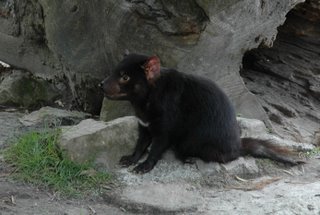 This is the chap himself ... the Tasmanian Devil. Quite cuddly looking ... until he opened his gob for a yawn. Cripes, no wonder they're called the vacuum cleaners of the forest. On the drive back I noticed a sign for the Something Wild animal sanctuary - so I made a spur of the moment decision to drop in and see what it was about. I was greeted at the entrance buy a chap with a fully grown koala bear in his arms (and a huge scratch across his forehead).
This is the chap himself ... the Tasmanian Devil. Quite cuddly looking ... until he opened his gob for a yawn. Cripes, no wonder they're called the vacuum cleaners of the forest. On the drive back I noticed a sign for the Something Wild animal sanctuary - so I made a spur of the moment decision to drop in and see what it was about. I was greeted at the entrance buy a chap with a fully grown koala bear in his arms (and a huge scratch across his forehead).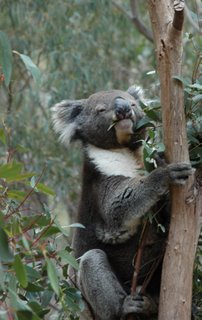 Koalas are so snobby ! Just look at the expression on his face. They never want to look at the camera, either. I had to coax this one out with a few verses of "Waltzing Koala" - it listened to this for a bit, then had the nerve to hold up a placard with a score of 4 on it. Bloody cheek ! You can go back to stuffing your face with Eucalyptus leaves for all I care.
Koalas are so snobby ! Just look at the expression on his face. They never want to look at the camera, either. I had to coax this one out with a few verses of "Waltzing Koala" - it listened to this for a bit, then had the nerve to hold up a placard with a score of 4 on it. Bloody cheek ! You can go back to stuffing your face with Eucalyptus leaves for all I care.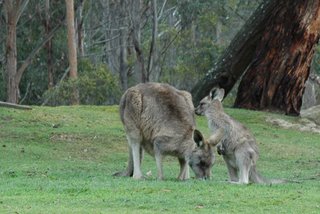 Baby Roo ! I can't deny it - this is here for the blatant "Aaah" value.
Baby Roo ! I can't deny it - this is here for the blatant "Aaah" value.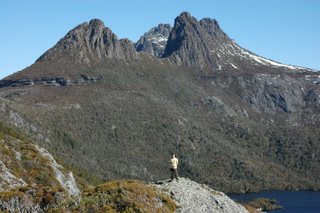 On top of the bottom of the world. The real jewel in my time in Tasmania was a trip up to the Cradle Mountain. I decided on an organized tour this time, as before I'd just rolled up to places on my own initiative. The weather is very, very changeable around here and I am told there are only forty days a year when it is really bright and clear for a significant amount of time. I somehow lucked out, because it was absoloutely perfect weather for the duration of the day. The air here is possibly some of the cleanest in the world, and the scent of some of the plants and herbs that grow up here envelops you. You can't see the expression on my face in this photo ... suffice to say there was an almost sheer drop behind me. You can also tell from the angle this is taken how much I had to walk down again from where Lee (our guide) was standing with the camera.
On top of the bottom of the world. The real jewel in my time in Tasmania was a trip up to the Cradle Mountain. I decided on an organized tour this time, as before I'd just rolled up to places on my own initiative. The weather is very, very changeable around here and I am told there are only forty days a year when it is really bright and clear for a significant amount of time. I somehow lucked out, because it was absoloutely perfect weather for the duration of the day. The air here is possibly some of the cleanest in the world, and the scent of some of the plants and herbs that grow up here envelops you. You can't see the expression on my face in this photo ... suffice to say there was an almost sheer drop behind me. You can also tell from the angle this is taken how much I had to walk down again from where Lee (our guide) was standing with the camera.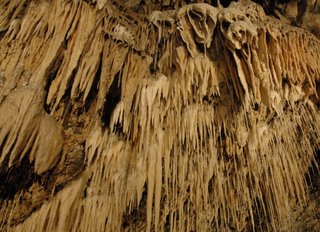 I also spent a bit of the day underground, in the Marakoopa Caves, which are described as 'active caves' as the limestone stalagtites and stalagmites are still forming. The dark, cold isolated and surrealness of the cave made me think that this was more similar to somewhere like Mars, rather than what was a few hundred metres above us. The strangest sight was the glow worm cavern - thousands of pulsing lime green points, hiding and then re-appearing behind the myriad stalagtite fingers. It was undeniably similar to the constellations of the night sky, yet we were 150m below rainforest.
I also spent a bit of the day underground, in the Marakoopa Caves, which are described as 'active caves' as the limestone stalagtites and stalagmites are still forming. The dark, cold isolated and surrealness of the cave made me think that this was more similar to somewhere like Mars, rather than what was a few hundred metres above us. The strangest sight was the glow worm cavern - thousands of pulsing lime green points, hiding and then re-appearing behind the myriad stalagtite fingers. It was undeniably similar to the constellations of the night sky, yet we were 150m below rainforest.Tasmania is one of the smallest states of Australia, but it has bewildering differences in geography even over small distances. From the vividness of the midlands, the landscape around the mountains took on a different and strange palette. The colours looked completely unsaturated, pale, cool - but also very defined and rugged. Not just the blues and whites of a mountainscape, but also burnt red earths and bleached, skeletal trees. Or the cool, secluded greens of the Gondwana forest, where moss lies like snow over every root and trunk. The cover of the tree canopy is so dense that despite the bright sun above, it's acts like a huge natural refridgerator. Lee explained that despite the beauty of the area, it was extremely important to have your wits about you, and to plan treks properly - the bush claims it's fair share of people who just wander off and are never seen again. During our drives about, I commented that much of the countryside looked quite English (particularly the village of Deloraine). This apparantly is deliberate, as the colonists who originally came here tried to introduce vegetation and wildlife from the British Isles, probably in an attempt to make it a bit more like home. Obviously this led to a fair bit of environmental damage, and the gorse in particular took a good hold on the land.
 I'm told this a 'Paddymella' - a smaller species of kangaroo, much like a wallaby. Look closely at the pouch - it's not being rude, that's one of it's newborns.
I'm told this a 'Paddymella' - a smaller species of kangaroo, much like a wallaby. Look closely at the pouch - it's not being rude, that's one of it's newborns. And here's the wombat. Just ambling across the road as it pleased. It can't be seen here, but this one was also carrying a baby wombat in her pouch - only visible from the rear. When attacked, wombats will make a beeline for their holes, and present their arse to the outside world (I can see the appeal of such an action sometimes). I'm told they have a sort of toughened plate, much like the shell of a tortoise, and if a predator such as a dog tries to force it's way into their den, they make a small gap and then crush the skull of their foe against the upper wall. So don't try it !
And here's the wombat. Just ambling across the road as it pleased. It can't be seen here, but this one was also carrying a baby wombat in her pouch - only visible from the rear. When attacked, wombats will make a beeline for their holes, and present their arse to the outside world (I can see the appeal of such an action sometimes). I'm told they have a sort of toughened plate, much like the shell of a tortoise, and if a predator such as a dog tries to force it's way into their den, they make a small gap and then crush the skull of their foe against the upper wall. So don't try it !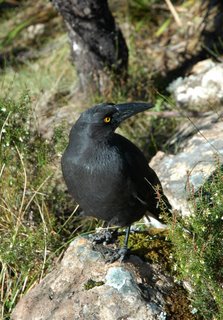 Ah, the old 'looking thoughtful' trick, eh ? I know what you're about, my lad ... plotting another muffin heist I'm sure. This beaked sod had them away the minute you turned your back - I'll see you in court old son.
Ah, the old 'looking thoughtful' trick, eh ? I know what you're about, my lad ... plotting another muffin heist I'm sure. This beaked sod had them away the minute you turned your back - I'll see you in court old son.
